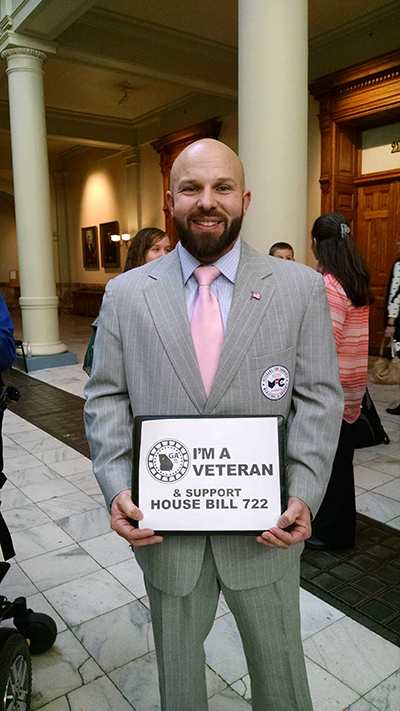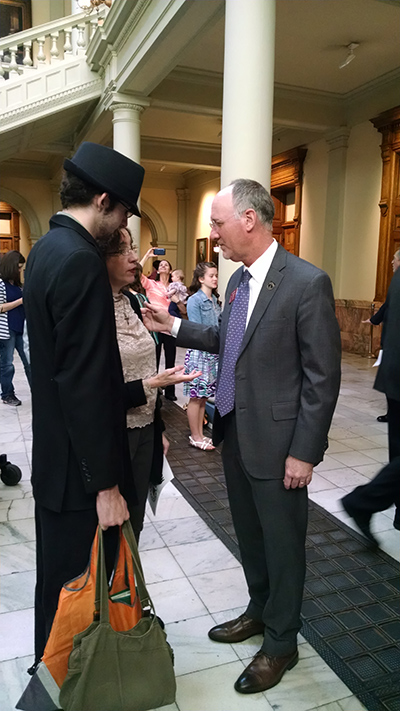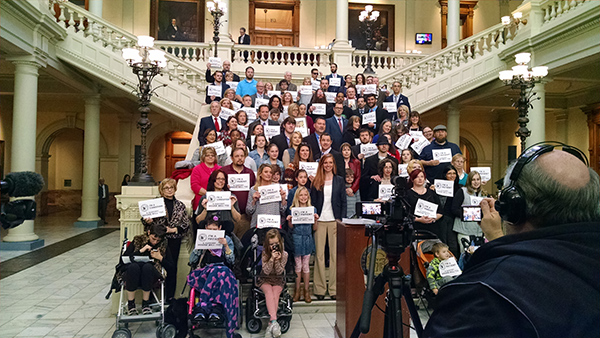
Joshua Littrell, founder of Veterans for Cannabis, holds his sign showing support for House Bill 722. He fights for access to cannabis for veterans suffering from post-traumatic stress disorder. |
Supporters of a bill that would allow for the cultivation of medical marijuana in the state gathered at Georgia’s capitol Tuesday, Feb. 16 to deliver a petition to the governor.
The press conference featured citizens and legislators showing their support of House Bill 722, widely considered to be an expansion upon last year’s HB 1, which legalized the possession of medical cannabis to treat eight qualifying conditions. HB 722 is focused on allowing cultivation of medical cannabis in the state.
“This is an important day for the citizens to speak up for their concerns about this issue,” said Rep. Allen Peake, R-Macon. He is the main sponsor of the bill and was also the sponsor of last year’s bill as well. “I’m excited to see a lot of people here today,” he said. “This is government at its best, when the citizens voice their opinion and express their desires.” More than 50 citizens stood on the grand stairway in the capitol holding signs declaring their support of HB 722. Some included veterans in the state, who look to cannabis oil as a natural and safe alternative to prescription treatments for post-traumatic stress disorder.
“With PTSD you need immediate relief,” said Joshua Littrell, the founder of Veterans for Cannabis. “You don’t need something that takes two or three hours to work in a pill form or something like that, you need to get out of that situation right then and there.”
Cannabis, he explains, offers the immediate relief needed during episodes of PTSD, which can include night terrors or ‘lock-ups’ when a victim is frozen with sudden anxiety. According to Littrell, a bill passed in December allows Veterans Administrations to recommend cannabis to patients in states that have legalized it. He wants to get Georgia on the list of states that allow it so that VA doctors can recommend it to veterans in need.
Littrell’s goal, and the goal of his organization, is to increase access to cannabis for veterans to decrease the high number of suicides due to PTSD and overdose of prescription medication.
“Nobody’s ever overdosed and died from cannabis and nobody ever will,” he said. “That’s why I’m fighting so hard.”

Rep. Allen Peake listens to the concerns of a supporter of cannabis cultivation. Peake is the main sponsor of House Bill 722. |
The new bill would include PTSD as one of the qualifying conditions to obtain cannabis from a physician.
Parents bring their support
Aside from veterans, many parents were at the capitol in support of the bill, including Vince Sievert. Four years ago, his oldest daughter was diagnosed with epilepsy. After dozens of medications and no results, doctors determined her to be intractable and resistant to the anti-seizure medications. The last option presented to them was to schedule an appointment with a neurosurgeon to have a portion of her brain removed. Sievert and his wife did not feel comfortable with this and, after extensive research, they discovered cannabis oil.
“To make a long story short, I split my family,” he said. Because of state laws, his wife took their two daughters to Colorado to begin a cannabis oil treatment while Sievert stayed in Georgia with their two sons. According to Sievert, they saw results after her first dose, and he knew they had made the right decision. They stayed for six months before returning home to Georgia, and their daughter has now been weaned off of all but one pharmaceutical drug. “We have to break laws,” Sievert said. “We have to go to Colorado and purchase it and fly back.”
Sievert spoke briefly in front of the media during the press conference, along with Jennifer Conforti, who testified in front of a House of Representatives committee in January. Her 5-year-old daughter was diagnosed with severe autism, and two years ago she began serious injurious behaviors. “She bit her arm, she bit us, she bit the dog,” Conforti said. “She bit anything she could possibly get her mouth on, to the point where we had to restrain her for hours a day to keep her from hurting herself.” After nine months of attempting to help her with prescription medications and experimental biological tests and treatments, she researched the positive effects of cannabis oil.
“I finally decided to take it upon myself to figure out how to get it,” she said. “In four days, she stopped her ‘major raging.’” During her testimony in front of the House committee, Conforti admitted to legislators that she is forced to break federal law to obtain the cannabis oil her daughter needs. Since her testimony, she has received a flood of emails, letters and Facebook messages from parents across the state who are in a similar situation.
“I feel the pain of these parents who have reached out to me since I testified,” she said. “Each story is just as bad, if not worse, than mine.” In her speech during the press conference, she addressed these parents who are doing everything in their power to help their suffering children and begged the governor to hear their pleas. She also directly confronted recent comments by Walker County Sheriff Steve Wilson.

Supporters of House Bill 722 show their support of the cultivation of medical cannabis in Georgia on the steps of the capitol. |
“Sometimes we’re dealt hands we don’t necessarily like, but we are dealt those hands and we have to do the best we can with them,” Wilson said in a Feb. 10 article by 11Alive News. Wilson is also the president of the Georgia Sheriffs’ Association.
“You have no idea how arrogant and cavalier that statement is to a mother like me,” Conforti responded at the press conference, “who has to watch her child hurt herself because she doesn’t know any other way to communicate. You, sir, sheriff, are ignorant at best.” Enforcers of the law
The Georgia Sheriffs’ Association had no presence at Tuesday’s press conference, but they recently added an announcement to their website listing the organization’s position on five main points of medical marijuana and cannabis in the state. The second listing details that they “oppose the cultivation of marijuana for all purposes.”
Terry Norris, the executive director of the Georgia Sheriffs’ Association, explained that this is the consensus of the 159 sheriffs in the state. The main concern is that this bill could be a slippery slope that could eventually lead to the legalization of recreational marijuana in Georgia. “I think those concerns are unfounded,” Peake said in response. “There’s 23 other states that have medical cannabis legislation in place so there’s a model for how we can have a proper regulatory structure.”
He also added that he has no intent to ever legalize recreational marijuana. “This is for medicine for people who desperately need it and it should be our responsibility as legislators to come up with a solution that works for our citizens,” Peake said.
Norris added that there may be a possibility for sheriffs in the state to consider cultivation under certain conditions. “I think they [the sheriffs] would have a conversation about cultivation if that cultivation was closely held and scrutinized and conducted by a medical research institution in the state,” Norris said.
After several guest speakers at the press conference said their part, a few families accompanied legislators in delivering the petition with over 12,000 signatures to Gov. Nathan Deal’s office.



















